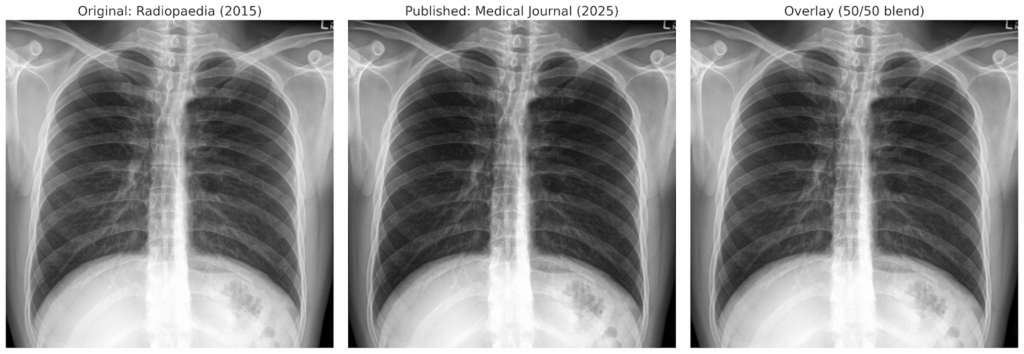
A journal has retracted a study on ‘Tin Man Syndrome’ plagiarized from a decade-old April Fools’ joke — which the author now admits was fake.
On August 15, we wrote about a “rare case report” published in Medicine in which authors claimed they had encountered a case of “ectopia cordis interna” and described an asymptomatic man with his heart located in his abdomen. Sleuths believed the case report plagiarized images from a 2015 satirical paper describing a condition of the same name.
A week later on August 22, Medicine, published by Wolters Kluwer, retracted the paper and five others — all published this year — with shared authors. None of the papers have been cited, according to Clarivate’s Web of Science.
The retracted papers are:
- Acquired methemoglobinemia induced by dapsone in a 16-year-old female: A case report from Iraq-A case report
- Kokeshi phenomenon and coronary perforation with rotational atherectomy while treating heavily calcified coronary artery disease
- Small cell lung cancer progressing into fatal ascending motor and sensory polyneuropathy despite dramatic response to chemotherapy: A case report
- Congenital aortic arch abnormality in tetralogy of Fallot: A rare case report
- Severe headache as a key symptom in bilateral idiopathic adrenal hyperplasia-induced primary hyperaldosteronism: A case report
- Asymptomatic young male with ectopia cordis interna: A rare case report
The retraction notice for the ectopia cordis interna case states the authors were “unable to provide the necessary documentation, which casts doubt on the credibility of the presented case.”
The other notices linked above read, in part:
Information brought to our attention during a recent investigation casts doubt on both the authorship and credibility of the presented case, and the Publisher has lost faith in the integrity of the content.
The corresponding author on all six studies is Ashraf Basalilah, a researcher at Hadhramaut Hospital in Yemen. Basalilah shared an August 21 email sent to him by journal editor Megan Larkin in which she notes concerns with the other five case studies, “while not enough on their own to justify retraction, taken with the allegations above, present a pattern of submission and authorship that raises serious questions.” She then lists several concerns about authors on the papers, such as lack of public records and contact information to confirm author affiliations, outdated affiliations and incomplete author profiles.
“As a result of this investigation, we have concluded that we can no longer support the validity of the content submitted by the corresponding author,” Larkin continued.
Neither Larkin nor Maya Workowski, another editor and Wolters Kluwer, responded to our request for comment. Several emails to Medicine’s listed contact email went unanswered.
Basalilah told us the paper was “a trap made by someone who wants to destroy my career intentionally” and that the person in question, who Basalilah says is not a medical professional, provided the researchers with “all the case details and documentations” regarding the ectopia cordis interna case.
“I trusted that guy and his documentation done everything based on that, we all the authors were not involved in the patient’s care or management [sic],” Basalilah continued.
At the time of our first article, Basalilah provided redacted versions of what he said were the patient’s file, ethical approval paperwork, hospital and radiology department verification letter and patient consent form. He told us he couldn’t share photos of the patient’s body or face for consent reasons.
After the paper was retracted, Basalilah told us: “I admit that Ectopia cordis is not real case based on our investigation and t was faked … to destroy authors’ reputation [sic].”
Basalilah stood by his other five case studies, calling them “real, credible and valid.” He said he disagreed with the retractions of those five, and said the journal “has not found any mistakes or justification for retracting them.
David Sanders, an image expert and biologist at Purdue University in West Lafayette, Ind. who weighed in on the images in our previous story, told us from his experience, “when one finds egregious problems in one article it is probable that other articles from one or more of the authors also violate scientific norms.”
Like Retraction Watch? You can make a tax-deductible contribution to support our work, follow us on X or Bluesky, like us on Facebook, follow us on LinkedIn, add us to your RSS reader, or subscribe to our daily digest. If you find a retraction that’s not in our database, you can let us know here. For comments or feedback, email us at [email protected].
Perhaps the authors would be interested in a study I am putting together about “Scarecrow Syndrome”?
Whom in the scientific publication ecosphere could it possibly afflict? I’m open to suggestions. “With the thoughts you’d be thinkin’, you could be another Lincoln, if you only …”
Make sure to cite de Oliveira et al (2012), who published about survivable brainlessness in a case of severe hydrocephalus, but plagiarised their images from an earlier paper.
https://www.frontiersin.org/journals/human-neuroscience/articles/10.3389/fnhum.2011.00181/full
He was given the documents by someone who wasn’t a medical professional and presumably wasn’t authorised to have them. Sounds like a new version of fell off the back of a truck.
“we all the authors were not involved in the patient’s care or management”
That alone is grounds for retraction.